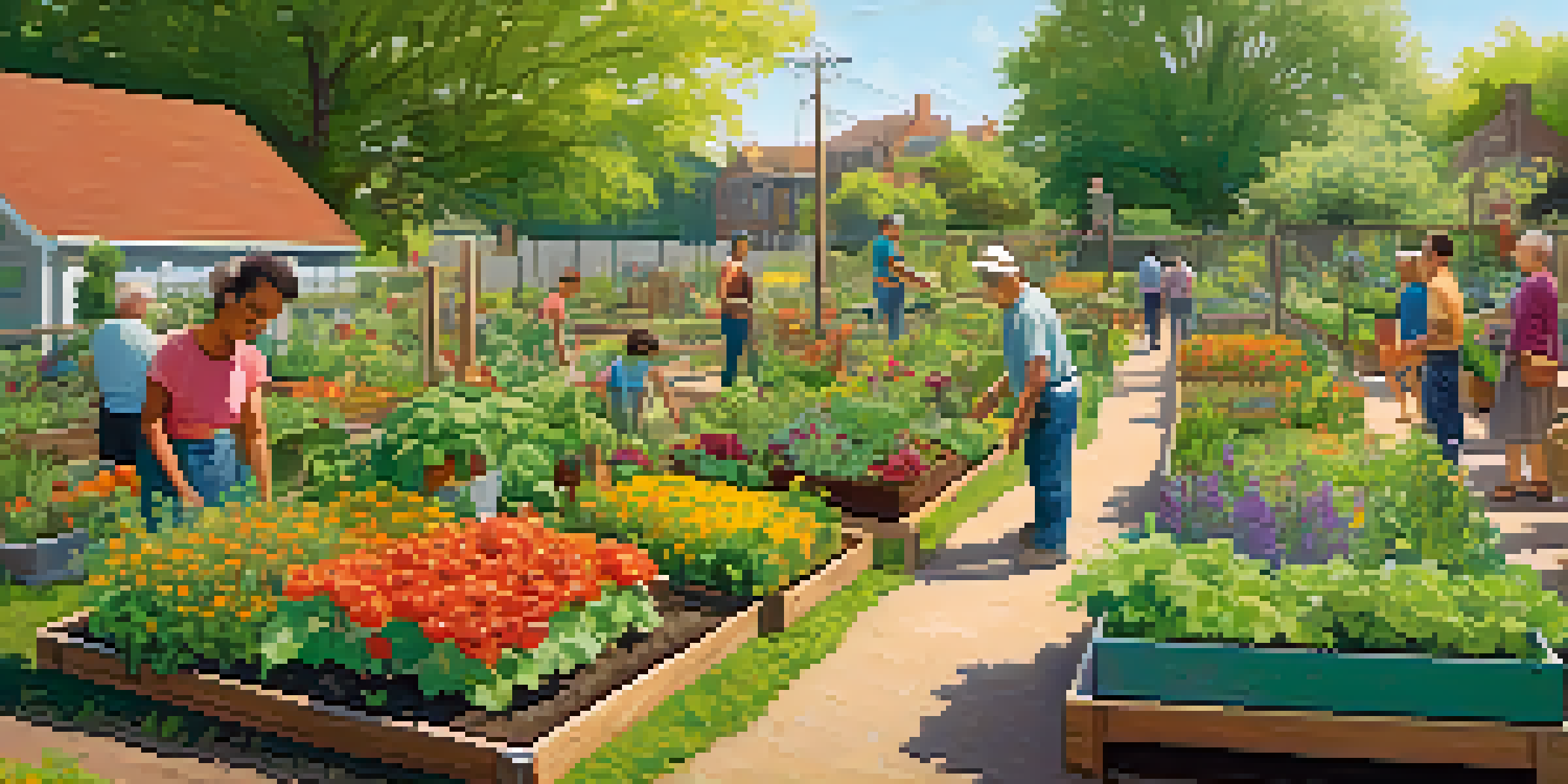How Community Gardening Contributes to Local Economic Development

Understanding Community Gardening: A Growing Trend
Community gardening involves individuals coming together to cultivate a shared piece of land. This trend has gained traction in urban areas where green spaces are limited. Not only does it provide fresh produce, but it also fosters a sense of community among neighbors.
The greatest gift of the garden is the restoration of the five senses.
These gardens serve as hubs for social interaction, allowing residents to bond over shared goals. When people work side by side, they build relationships that can lead to collaborative efforts beyond the garden. It’s this connection that often sparks further community initiatives.
By transforming vacant lots into productive spaces, community gardens contribute to the overall appeal of neighborhoods. This transformation can lead to increased property values, attracting more families and businesses to the area.
Job Creation: Opportunities Through Gardening
Community gardens can create jobs, both directly and indirectly. For example, these gardens often need coordinators, educators, and volunteers, which opens up employment opportunities in the local community. Additionally, local farmers may benefit from partnerships, leading to increased sales and job openings.

As gardens flourish, they often require maintenance and support, which can lead to the hiring of local workers. This not only boosts the economy but also provides valuable hands-on experience for those seeking work in agriculture or environmental fields. It's a win-win situation.
Community Gardens Boost Local Economy
By creating jobs and inspiring related businesses, community gardens significantly contribute to local economic development.
Furthermore, the rise of community gardening can inspire related businesses, such as garden supply stores or farmers' markets. These businesses serve the gardening community and contribute to job creation, further enhancing local economic development.
Increasing Access to Fresh Produce
One of the most significant benefits of community gardening is the increased access to fresh, healthy food. Many urban areas lack grocery stores that offer fresh produce, leaving residents with limited options. Community gardens fill this gap by providing locally grown fruits and vegetables.
In every walk with nature one receives far more than he seeks.
This access can improve overall community health, reducing medical costs associated with diet-related illnesses. When residents have the opportunity to eat fresh, nutritious food, it can lead to healthier lifestyles. This, in turn, reduces strain on local healthcare systems.
Moreover, community gardens often operate on a model that encourages sharing, allowing participants to take home a share of the harvest. This not only enhances food security but also fosters a sense of pride and ownership in the community's well-being.
Building Skills and Knowledge in the Community
Community gardening is an excellent platform for education and skill development. Through workshops and hands-on experience, participants learn about sustainable farming practices, horticulture, and nutrition. This knowledge can empower individuals to make better choices for themselves and their families.
Moreover, these gardens often serve as outdoor classrooms for schools and community groups, teaching children and adults alike about the importance of food systems. By understanding where their food comes from, community members can develop a deeper appreciation for local agriculture.
Fresh Produce for Healthier Communities
Community gardens increase access to fresh fruits and vegetables, promoting better health and reducing diet-related illnesses.
As people gain skills in gardening and food production, they become more self-sufficient. This empowerment can lead to entrepreneurial opportunities, such as starting small businesses related to gardening or selling produce at local markets.
Fostering Local Entrepreneurship and Business Growth
Community gardens can be a catalyst for local entrepreneurship, offering a space for small businesses to thrive. Local farmers or artisan food producers can use the produce from these gardens to create unique products, such as jams or baked goods. This not only diversifies local offerings but also supports the economy.
As these businesses grow, they create jobs and contribute to the local tax base, further enhancing economic development. Additionally, community gardens can host events like farmer’s markets or craft fairs, providing a platform for local artisans to showcase their products.
This symbiotic relationship between gardening and entrepreneurship can lead to a vibrant local economy. When community members support each other’s businesses, it fosters a sense of pride and investment in the community’s future.
Enhancing Community Cohesion and Resilience
Community gardens play a vital role in enhancing social cohesion among residents. By working together towards a common goal, individuals from diverse backgrounds can unite and form strong bonds. This sense of belonging is essential for building resilient communities.
During challenging times, such as economic downturns or natural disasters, these gardens become vital resources. They provide food security and a support network for residents, ensuring that everyone has access to what they need. This resilience is crucial for communities to thrive.
Building Connections and Resilience
These gardens enhance social cohesion and provide vital support networks during challenging times, fostering a stronger community.
Moreover, community gardens can serve as meeting points for activism and local initiatives. When residents come together in a shared space, they are more likely to collaborate on projects that address other community needs, creating a cycle of positive change.
Environmental Benefits of Community Gardening
Beyond economic development, community gardens offer numerous environmental benefits. They promote biodiversity by creating habitats for various plant and animal species. This increased biodiversity helps to maintain a balanced ecosystem, which is crucial for a healthy environment.
Additionally, these gardens can improve air quality and reduce urban heat effects by providing green spaces that absorb carbon dioxide. The presence of plants also helps to mitigate stormwater runoff, reducing the risk of flooding in urban areas.

By fostering a connection to nature, community gardens encourage residents to adopt sustainable practices. This mindset can lead to greater environmental stewardship within the community, benefiting not just the present generation but also future ones.